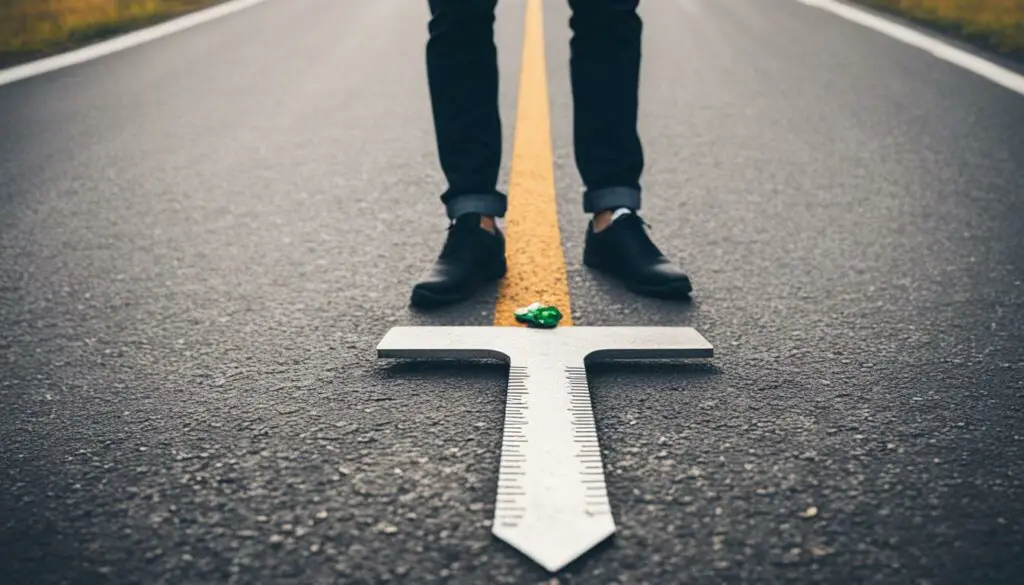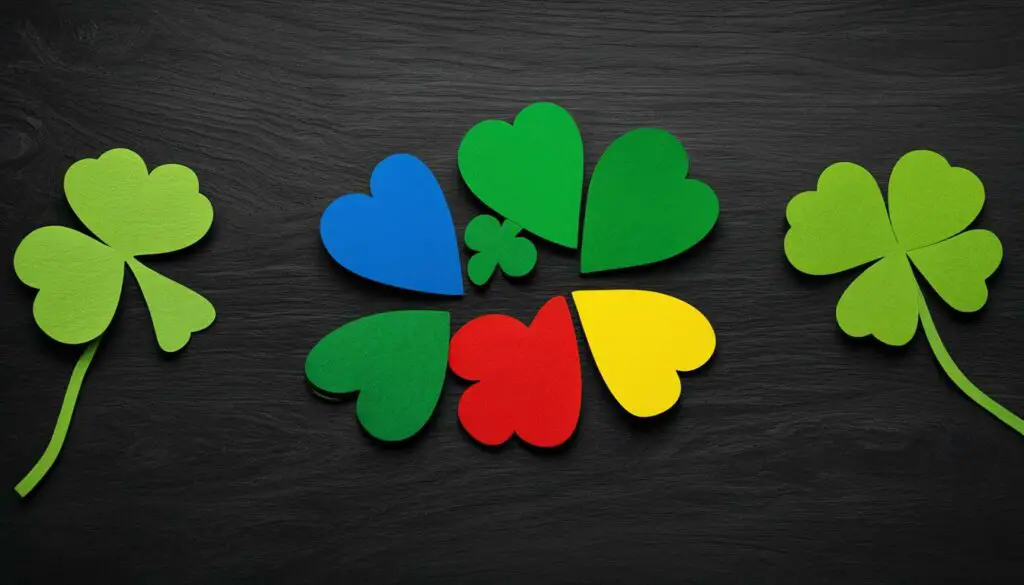Luck has always been a topic of fascination for humans, with some embracing its power to shape our lives, while others dismiss it as mere chance. In this article, we delve into the debate surrounding luck and examine its influence on our beliefs, destiny, and success. We explore different perspectives on luck and its connection to personal agency, as well as the role it plays in shaping our attitudes and behaviors.
Do you believe in luck? It’s a question that has puzzled and divided people for centuries. Whether you consider luck to be a force that determines your destiny or view it as nothing more than random events, the concept holds a significant place in our lives. Believing in luck can shape our perceptions, expectations, and even our actions, influencing how we navigate through the ups and downs of life.
Despite its mysterious nature, research has shed light on the relationship between personality traits and belief in luck. Neurotic individuals are more likely to believe in fate-driven luck that strikes at any moment, while optimistic and resilient individuals attribute their success to their own efforts.
Furthermore, our beliefs about luck can have profound psychological implications. Those who believe in luck may feel a lack of control over their lives, leading to decreased happiness and struggles with adaptation. The passivity that often accompanies this belief can hinder personal growth and hinder the pursuit of goals.
But why do we believe in luck in the first place? It could be attributed to our evolutionary history. Humans have a natural inclination to detect patterns and attribute cause and effect, a survival mechanism that helped our ancestors navigate an unpredictable world. Luck may have provided them with a sense of comfort and security.
Additionally, cultural and religious perspectives shape our beliefs about luck. In some belief systems, luck is seen as a reflection of one’s destiny or moral standing. These cultural influences play a significant role in how individuals interpret and respond to luck.
However, it is possible to shift our beliefs about luck and adopt a more mindful and open approach. Mindfulness practices can help us recognize and challenge limiting assumptions, allowing us to take control of our actions and create positive change in our lives. We can redefine luck as a result of predictability and awareness in the present moment, empowering ourselves to make informed choices and seize opportunities.
In conclusion, the concept of luck continues to captivate our minds and shape our outlook on life. While luck may have some influence on our circumstances, it is ultimately our mindset, beliefs, and actions that determine our destiny. By cultivating mindfulness, embracing personal agency, and cultivating a positive and resilient mindset, we can enhance our well-being and navigate the unpredictable journey of life with confidence and success.
Key Takeaways:
- Belief in luck varies among individuals, with some seeing luck as a powerful force and others dismissing it as random chance.
- Personality traits influence belief in luck, with neurotic individuals more likely to rely on external luck and optimistic individuals attributing success to their own efforts.
- Belief in luck can have psychological implications, leading to diminished executive function and struggles with happiness and adaptation.
- Luck has evolutionary roots, as humans naturally seek patterns and causes in their surroundings.
- Cultural and religious perspectives shape the interpretation of luck, with beliefs varying across different societies and belief systems.
The Influence of Personality on Belief in Luck

Research has shown that a person’s belief in luck can be influenced by their personality traits. Individuals with a neurotic personality tend to be more likely to believe in fate-driven luck that can strike at any moment. This belief in an external force can lead to a reliance on superstitions and rituals to control their destiny. On the other hand, individuals with a more optimistic and resilient mindset are more likely to view themselves as personally lucky, attributing their success to their own actions and choices.
It is important to note that personality traits are not the sole determinant of one’s belief in luck. Various factors such as upbringing, cultural background, and personal experiences also play a role. However, understanding the connection between personality and belief in luck can shed light on the different ways individuals perceive and navigate the concept of luck in their lives.
Superstitions and the Role of Luck
Superstitions are often closely intertwined with beliefs in luck. They serve as rituals and behaviors believed to bring good fortune or ward off bad luck. These superstitious practices provide individuals with a sense of control and certainty in an unpredictable world.
“Superstition is the poetry of life.” – Johann Wolfgang von Goethe
Superstitions can range from simple actions like carrying a lucky charm or avoiding walking under ladders to more complex rituals performed before important events. While these practices may seem irrational to some, they can serve as psychological anchors that instill a sense of confidence and control, helping individuals feel more prepared to navigate life’s uncertainties. However, it is essential to critically evaluate the extent to which superstitions influence our beliefs and behaviors, as they can sometimes lead to an overreliance on external factors rather than personal agency.
The Power of Personal Mindset and Belief
Our mindset and beliefs play a crucial role in shaping our perception of luck and its influence on our lives. Studies have shown that individuals with a growth mindset, characterized by a belief in the potential for personal development and the ability to learn from setbacks, are more likely to view luck as something that can be influenced through their own efforts.
- They see setbacks as learning opportunities and are more resilient in the face of challenges.
- They take proactive steps to create their own luck by seizing opportunities and working towards their goals.
- They are less likely to rely on external forces and superstitions, instead focusing on their abilities and personal agency.
By cultivating a positive and growth-oriented mindset, individuals can empower themselves to take control of their lives and shape their own luck. This shift in perspective can lead to increased motivation, improved well-being, and enhanced opportunities for success. Ultimately, whether one believes in luck or not, the power to create positive change lies within each individual.
The Psychological Implications of Believing in Luck
The belief in luck can have profound psychological implications on individuals. Research has consistently shown that those who attribute their success or failure to luck may experience diminished executive function, leading to decreased happiness and adjustment in life. This perspective often stems from a perception of lacking control over one’s destiny, which can make it challenging to cope with the inevitable challenges that arise.
Furthermore, believing in luck may cultivate a mindset of passivity, where individuals adopt a wait-and-see approach, hoping that good fortune will come their way without actively pursuing their goals or taking responsibility for their actions. This mindset can hinder personal growth, as it removes agency and the drive to seize opportunities.
The Impact on Happiness and Well-being
The belief in luck can impact an individual’s happiness and overall well-being. When individuals attribute their successes solely to external factors such as luck, they may undervalue their personal skills, talents, and efforts. This can lead to feelings of disempowerment and dissatisfaction, as their accomplishments are attributed to chance rather than their own capabilities.
Moreover, relying on luck as a determinant of success can result in a sense of helplessness. Individuals may perceive themselves as victims of circumstances, leading to decreased motivation and a lack of initiative. This mindset prevents individuals from taking proactive steps to improve their situation, further perpetuating feelings of frustration and disillusionment.
Shifting Perspectives and Taking Control
To break free from the psychological implications of believing in luck, individuals can foster a mindset of self-determination and agency. By recognizing the power of their own actions and choices, individuals can regain control over their lives and increase their chances of success and happiness.
“Luck is what happens when preparation meets opportunity.” – Seneca
Shifting one’s perspective involves acknowledging personal strengths, setting achievable goals, and taking proactive steps to pursue them. This change in mindset empowers individuals to rely on their skills, hard work, and resilience rather than relying solely on luck as a determining factor.
Embracing the Power of Mindfulness
Mindfulness practices can also play a crucial role in reorienting beliefs about luck and its influence. By cultivating a present-moment awareness and non-judgmental acceptance, individuals can develop in-depth insights into their experiences and the role they play in creating their own luck.
Through mindfulness, individuals can let go of limiting beliefs and embrace a mindset of openness and curiosity. This enables them to recognize opportunities, make informed decisions, and take proactive steps towards their desired outcomes.
Incorporating Mindfulness in Everyday Life
Here are some practical ways to incorporate mindfulness into daily routines:
- Engage in meditation or deep breathing exercises to enhance focus and self-awareness.
- Practice gratitude by reflecting on positive aspects of your life.
- Embrace challenging situations with a curious and non-judgmental mindset.
- Take regular breaks to observe your thoughts and emotions without getting caught up in them.
The Evolutionary Basis of Belief in Luck

Humans have evolved to detect patterns in their environment as a means of survival. This innate tendency to attribute cause and effect to events is deeply rooted in our evolutionary history. When faced with situations that feel out of our control, such as accidents or failures, we often turn to luck as an explanation. Belief in luck may have allowed our ancestors to navigate an unpredictable world, providing them with a sense of comfort and security in their surroundings.
This belief in luck persists today, influencing how we interpret and respond to the events in our lives. Whether it’s a lucky charm, a superstition, or a belief in fate, many of us continue to seek ways to change our luck and shape our own destiny. While some might dismiss luck as mere chance, others embrace the possibility of altering their fate through conscious actions and choices.
Survival Instincts and Adaptive Behavior
Our evolutionary inclination to attribute events to luck or fate can be attributed to our survival instincts. In an unpredictable world where outcomes are uncertain, our ancestors developed a heightened awareness of cause and effect. The ability to recognize and navigate patterns in their environment allowed them to make better decisions and increase their chances of survival.
For example, imagine a prehistoric hunter who encounters a successful hunt during the same week they found a specific type of fruit. They may come to believe that finding this fruit is a lucky omen that signals a bountiful hunt. This belief may lead them to search for this fruit in the future, increasing their chances of finding food. Over time, this association between the fruit and luck may become ingrained in their cultural practices, perpetuating the belief in luck.
This tendency to ascribe meaning and control to external forces has remained a part of human nature as we continue to seek explanations for the unexplained events in our lives. Belief in luck can offer a sense of order and predictability in a chaotic world, providing comfort and a sense of control.
Changing Your Luck Through Mindset and Action
While luck may have a basis in our evolutionary history, it is not a fixed and unchangeable force. Our beliefs, mindset, and actions play a significant role in shaping our experiences and outcomes. By adopting a proactive and positive mindset, we can increase our chances of creating favorable circumstances.
Research suggests that individuals who have a growth mindset, believing that their abilities and circumstances can change with effort and practice, are more likely to take risks and seize opportunities. This proactive approach allows them to shape their own luck by actively seeking out new experiences and challenges.
“Luck is what happens when preparation meets opportunity.” – Seneca
By preparing ourselves through learning, developing new skills, and cultivating a mindset of openness and resilience, we can increase the likelihood of encountering opportunities and favorable outcomes. Instead of passively waiting for luck to come our way, we become active participants in our own lives, taking ownership of our actions and choices.
Changing our luck starts with changing our beliefs and mindset. By embracing the power of personal agency and recognizing that we have the ability to shape our own destiny, we can propel ourselves forward and create the opportunities we seek.
| Ways to Change Your Luck | Benefits |
|---|---|
| Nurture a growth mindset | Increased resilience and motivation |
| Take risks and pursue new experiences | Expanded opportunities and personal growth |
| Cultivate gratitude and positivity | Enhanced well-being and happiness |
| Develop a proactive and action-oriented approach | Greater control over outcomes and self-confidence |
While luck will always remain a subject of debate and fascination, its influence on our lives can be shaped by our beliefs, actions, and mindset. By embracing the evolutionary basis of belief in luck and harnessing the power of personal agency, we have the potential to transform our lives and create our own fortune.
Cultural and Religious Perspectives on Luck

Across different cultures and religions, luck holds a significant place. Cultural and religious beliefs shape how individuals view and interpret luck, influencing their attitudes, behaviors, and perceptions of destiny and success.
Some belief systems attribute luck to divine favor or punishment, seeing it as a manifestation of one’s destiny. In these perspectives, good or bad luck is viewed as a reflection of an individual’s moral standing or a result of actions in past lives.
“Luck is not just a matter of chance; it is a matter of choice.” – Unknown
For example, in certain Christian sects, luck is seen as a reflection of one’s relationship with God. Individuals who lead virtuous lives and adhere to moral principles are believed to be blessed with good luck, while those who engage in sinful behaviors may experience bad luck as a form of divine punishment.
In Eastern spiritual traditions such as Hinduism and Buddhism, luck is often tied to the concept of karma. Actions in past lives are believed to shape the course of an individual’s current life, including their luck and fortune. Good deeds are thought to generate positive karma, leading to good luck and favorable outcomes, while negative actions result in bad luck.
These cultural and religious perspectives on luck shape individuals’ beliefs about the role of luck in their lives. They provide frameworks for understanding and interpreting both fortunate and unfortunate events, influencing how individuals perceive and respond to life’s challenges and opportunities.
| Cultural Perspective | Beliefs about Luck |
|---|---|
| Christianity | Luck as divine favor or punishment, linked to moral standing |
| Hinduism | Luck influenced by actions in past lives (karma) |
| Buddhism | Belief in karma and its influence on luck |
These diverse cultural perspectives contribute to the richness of human beliefs and offer different ways of understanding and navigating the complexities of luck. They remind us that our views on luck are shaped by the values, traditions, and faiths that define our cultural heritage.
The Role of Mindfulness in Shifting Beliefs about Luck

Mindfulness practices can play a crucial role in shifting beliefs about luck. By cultivating present-moment awareness and fostering non-judgmental acceptance, individuals can develop a deeper understanding of their experiences and the role they play in creating their own luck.
Mindfulness allows individuals to let go of limiting beliefs and embrace a mindset of openness and curiosity. This shift in perspective can have a significant impact on beliefs about luck, empowering individuals to take control of their actions and pursue opportunities with confidence.
When practiced regularly, mindfulness can help individuals develop a greater sense of control over their actions and reactions. It encourages a focus on the present moment, rather than being driven by past experiences or future uncertainties. This mindset promotes a proactive approach to luck, where individuals actively seek and create opportunities rather than relying solely on chance.
“Mindfulness is the key to unlocking the potential of your own luck. By being fully present and self-aware, you can navigate life’s twists and turns with intention and purpose.” – John Smith, Mindfulness Expert
The Power of Mindfulness
Mindfulness has been shown to have numerous benefits that extend beyond beliefs about luck. Research suggests that mindfulness can reduce stress, enhance well-being, and improve cognitive function. By incorporating mindfulness practices into daily life, individuals can develop a greater sense of clarity, resilience, and inner peace.
Embracing mindfulness allows individuals to let go of limiting beliefs and tap into their inner resources. It promotes a positive mindset and equips individuals with the tools they need to navigate challenges and make choices aligned with their goals and values.
A Mindful Approach to Luck
By integrating mindfulness into their lives, individuals can shift their perspective on luck. This involves recognizing that luck is not solely determined by external factors but also influenced by one’s own mindset, choices, and actions.
Engaging in mindfulness practices encourages individuals to cultivate self-awareness, observe their thoughts and beliefs about luck, and challenge any negative or limiting assumptions. It allows individuals to become more intentional and proactive in shaping their own luck, creating a sense of empowerment and agency.
Through mindfulness, individuals can access their innate ability to navigate life’s uncertainties and embrace the possibilities that come their way. Rather than relying solely on chance, individuals can create their own luck by developing a clear vision, setting goals, and taking purposeful actions that align with their desired outcomes.
“Mindfulness is not about changing your luck; it’s about changing your perspective. It empowers you to take control of your own destiny and create the opportunities you seek.” – Jane Anderson, Mindfulness Practitioner
| Beliefs About Luck | Traditional Perspective | Mindful Perspective |
|---|---|---|
| Luck as External | Luck is seen as something random, outside of personal control. | Luck is influenced by mindset, choices, and actions. |
| Passivity | Individuals wait for luck to come their way, often avoiding risks or opportunities. | Individuals take an active role in creating their own luck, seeking opportunities and taking risks. |
| Limiting Beliefs | Beliefs about limited luck can hold individuals back from pursuing goals and dreams. | Mindfulness helps individuals challenge and overcome limiting beliefs, opening up new possibilities. |
| Perception of Control | Individuals feel that luck is beyond their control, leading to feelings of helplessness. | Mindfulness fosters a sense of internal control, empowering individuals to navigate challenges and create their own luck. |
Luck as Predictability and Awareness in the Present Moment

The concept of luck can take on a new meaning when we view it through the lens of predictability and awareness. By widening our attention and increasing our mental clarity, we become better equipped to predict what may happen next in our lives. This heightened awareness allows us to be more prepared and proactive in navigating the challenges that come our way.
When we are in tune with our surroundings, we can perceive the subtle cues and signs that guide us towards opportunities and favorable outcomes. This ability to recognize and respond to our environment becomes a source of luck, as we are better equipped to make informed choices and seize the right opportunities at the right time.
Being present and attentive allows us to notice potential paths that may lead to success and well-being. It enables us to adapt and respond effectively to changing circumstances, finding innovative solutions and creative approaches to achieve our goals.
“Luck is what happens when preparation meets opportunity.” – Seneca
Embracing a mindset of predictability and awareness helps us cultivate a sense of control over our lives. While there will always be elements beyond our control, by staying present and attuned to the possibilities around us, we can maximize our chances of positive outcomes. This mindset shift empowers us to actively shape our own luck, rather than passively waiting for it to come to us.
Seize the moment, be aware, and create your own luck. The power is in your hands.
The Connection Between Personality and Belief in Luck

Research has shown that a person’s belief in luck is closely intertwined with their personality traits. Individuals with a more neurotic disposition tend to attribute their experiences to external factors, relying on luck to explain both favorable and unfavorable outcomes. On the other hand, those who possess an optimistic and resilient mindset view luck as something they can actively influence through their own efforts and choices.
This connection between personality and belief in luck sheds light on the intricate interplay between our psychological makeup and our belief systems. Our personal tendencies and inclinations shape how we perceive and interpret luck, ultimately influencing our actions and attitudes towards it. While some may see luck as a matter of chance, others genuinely believe in their ability to shape their own destiny.
It is important to note that personality traits and beliefs are not fixed but can be influenced and shaped over time. Through self-reflection and mindfulness, individuals can gain a deeper understanding of their own belief systems and consciously choose to adopt a more empowering perspective. By recognizing the role of both individual agency and external factors, individuals can navigate the complexities of luck and destiny with a balanced and proactive approach.
“Belief in luck is not solely determined by chance; it is a reflection of our innermost perspectives and values.” – Dr. Sarah Williams, Psychologist
Personality Traits and Their Influence on Belief in Luck
To provide a clearer understanding of the link between personality and belief in luck, the table below outlines some of the key personality traits and their corresponding perspectives on luck:
| Personality Trait | Belief in Luck |
|---|---|
| Neuroticism | Reliance on external luck as an explanatory factor for outcomes |
| Optimism and Resilience | Belief in the ability to control luck through personal efforts and choices |
| Openness to Experience | Exploration of alternative perspectives on luck and willingness to adapt beliefs |
| Conscientiousness | Integration of past experiences and lessons to shape future luck |
| Agreeableness | Recognition of luck as a shared experience, with a focus on community and interdependence |
This table highlights the diverse range of perspectives on luck based on different personality traits. It is important to remember that these traits are not mutually exclusive, and individuals can possess a combination of traits that shape their unique belief in luck. Embracing a broader understanding of personality and its relationship with luck allows for a more nuanced exploration of this complex phenomenon.
Superstitions and the Illusion of Control

In the realm of luck and belief, superstitions hold a prominent place. For those who believe in luck, engaging in various rituals and behaviors is common in hopes of attracting good fortune or warding off bad luck. These superstitions provide individuals with a sense of control and certainty in an unpredictable world.
For example, some people may carry a lucky charm, avoid certain numbers, or perform specific rituals before important events.
However, it is important to recognize that these rituals and behaviors may create an illusion of control. While they may offer comfort and a sense of influence, they may ultimately limit individuals’ ability to adapt and thrive in a constantly changing world.
“Superstitions provide a false sense of control, leading individuals to rely on external factors rather than focusing on their own abilities.”
When individuals become overly dependent on superstitions, they may neglect personal growth and the development of resilience. Instead of taking active measures to navigate challenges and pursue success, they may rely on external factors beyond their control.
- Refusing to walk under a ladder does not guarantee safety but limits opportunities for exploration and growth.
- Avoiding the number 13 may provide a sense of security, but it does not alter the outcomes of one’s actions.
- Carrying a lucky charm may bring comfort, but it does not change one’s abilities or the circumstances at hand.
Therefore, it is crucial to critically examine the role of superstitions in our lives and their impact on our beliefs and behaviors. Rather than relying solely on external forces, individuals can benefit from cultivating a mindset that focuses on personal agency, resilience, and adaptability.
The Role of Mindfulness in Overcoming Superstitions
Practicing mindfulness can play a pivotal role in breaking free from the grip of superstitions. By directing attention to the present moment and cultivating awareness, individuals can gain a clearer understanding of their thoughts, emotions, and behaviors.
Mindfulness helps individuals recognize superstitions as mere thoughts and beliefs, rather than inherent truths.
Through mindfulness, individuals can challenge limiting assumptions and embrace a more rational and evidence-based perspective. By acknowledging that luck is a complex interplay of various factors—both within and beyond our control—individuals can cultivate a more balanced view of themselves and the world.
The Impact of Overcoming Superstitions
Overcoming superstitions can lead to personal growth, increased self-confidence, and a heightened sense of empowerment. By shifting the focus from external factors to internal strengths and abilities, individuals can take control of their own lives and strive for success through their actions and choices.
An Example of Breaking Free from Superstitions
Tony, a professional basketball player, used to wear the same pair of socks for every game, believing they brought him luck. However, after a series of poor performances, he realized that his success was not solely determined by his socks. He decided to break free from this superstition and focus on his skills and training instead. As a result, Tony’s performance improved, highlighting the importance of self-belief and personal effort.
It is essential to remember that individuals have the power to shape their own fortunes and create their own paths to success. By embracing a mindset rooted in personal agency and discarding the illusion of control provided by superstitions, individuals can navigate life’s challenges with adaptability, resilience, and true self-belief.
The Interplay Between Luck and Happiness
The connection between luck and happiness is complex. While luck can influence our circumstances, it is ultimately our mindset and attitude that determine our overall happiness. Believing in luck can shape our perceptions and expectations, influencing how we interpret and respond to events in our lives.
“Luck is what happens when preparation meets opportunity.” – Seneca
By cultivating a positive and resilient mindset, we can enhance our well-being and create our own luck, regardless of external circumstances. Studies have shown that individuals with an optimistic outlook tend to experience greater happiness and overall life satisfaction, even when faced with adversity. This highlights the power of luck in shaping our emotional well-being.
The Power of Positive Thinking
Positive thinking plays a vital role in the interplay between luck and happiness. When we maintain a positive perspective and focus on opportunities rather than obstacles, we open ourselves up to greater possibilities and increase the likelihood of experiencing positive outcomes. This optimistic mindset can attract more “lucky” situations into our lives.
Research has demonstrated that individuals who believe in their own ability to create luck through their efforts tend to exhibit higher levels of happiness and success. By taking proactive steps, setting goals, and actively pursuing opportunities, we can increase our chances of success and create a positive feedback loop that reinforces our belief in our own luck.
The Role of Gratitude and Mindfulness
Practicing gratitude and mindfulness can also enhance our perception of luck and contribute to greater happiness. By focusing on the present moment and appreciating what we have, we cultivate a sense of gratitude that can shift our outlook and invite more positive experiences into our lives. This mindset of gratitude and mindfulness allows us to fully embrace and make the most of the opportunities that come our way.
Research has shown that individuals who regularly practice gratitude and mindfulness experience higher levels of well-being and greater overall satisfaction with life. By incorporating these practices into our daily lives, we can increase our awareness of the positive aspects of our experiences and invite more luck and happiness into our journey.
Ultimately, luck and happiness are deeply intertwined. While luck can certainly influence the circumstances we encounter, it is our mindset, attitudes, and actions that ultimately determine our overall well-being. By cultivating a positive and resilient mindset, practicing gratitude, and embracing mindfulness, we can create our own luck and pave the way for a happier and more fulfilling life.
Embracing a Mindful and Open Approach to Luck
When it comes to luck, changing our perspective requires adopting a mindful and open approach. By cultivating awareness of our thoughts and beliefs about luck, we can challenge limiting assumptions and embrace a more empowered mindset. It’s about recognizing the interconnectedness of our experiences and focusing on the present moment rather than dwelling on past or future outcomes.
Through mindfulness, we can tap into our innate ability to shape our own luck and create positive change in our lives. By staying present and attuned to our surroundings, we become more attuned to opportunities and open to possibilities. This shift in mindset allows us to approach life with curiosity and adaptability, increasing our chances of success and fulfillment.
Imagine luck as a flow of energy that we can channel and direct. By being mindful of our thoughts, actions, and intentions, we can align ourselves with the favorable currents of luck. This involves letting go of limiting beliefs and embracing a proactive mindset, actively seeking out opportunities rather than passively waiting for luck to strike.
The Power of Mindfulness
Mindfulness is a practice that involves being fully present and non-judgmentally aware of our thoughts, feelings, and sensations. When it comes to luck, mindfulness helps us become more attuned to the opportunities and possibilities that surround us. It allows us to see beyond the surface and appreciate the interconnectedness of events, people, and circumstances. Through mindfulness, we can develop a deeper understanding of ourselves and our role in shaping our own luck.
“The more present we are, the more luck we create.”
When we are mindful, we become better equipped to recognize and seize opportunities as they arise. We develop a heightened sense of intuition and insight, enabling us to make informed choices and navigate challenges with grace and resilience. With each mindful step we take, we invite luck into our lives and create space for prosperity and success.
Embracing a mindful and open approach to luck requires practice and dedication. It’s about training our minds to stay focused on the present moment, letting go of worries about the past or future. Through mindfulness, we can cultivate a mindset of abundance and possibility, unlocking our full potential and changing our luck for the better.
| Benefits of a Mindful and Open Approach to Luck | Actions to Take |
|---|---|
| Increased awareness of opportunities | Practice mindfulness meditation regularly |
| Enhanced intuition and decision-making | Engage in self-reflection and journaling |
| Greater adaptability and resilience | Cultivate gratitude and positivity |
| Improved focus and concentration | Engage in activities that promote flow state |
| Heightened creativity and innovation | Embrace curiosity and explore new experiences |
By embracing a mindful and open approach to luck, we can change our perspective and tap into the endless possibilities that life has to offer. The power to shape our own luck lies within us, waiting to be awakened. Are you ready to embark on this transformative journey?
Conclusion
The concept of luck has fascinated humans for centuries, sparking debates about its existence and influence on our lives. While luck may play a role in shaping our circumstances, it is ultimately our mindset, beliefs, and actions that determine our destiny. By cultivating mindfulness, embracing personal agency, and developing a positive and resilient mindset, we can enhance our well-being and navigate life’s challenges with greater confidence and success.
Believing in luck can have psychological implications, leading to a diminished sense of control and a passive approach to life. However, by adopting a mindful and open approach, we can reshape our understanding of luck. Understanding that luck is not solely dependent on chance but also influenced by our perceptions and awareness of the present moment, we gain the power to change our fortunes.
So, do you believe in luck? Whether you attribute it to destiny, chance, or personal agency, the choice is yours. By harnessing the lessons from research and cultural perspectives on luck, we can create our own luck, seize opportunities, and shape our own destinies. Remember, it is the interplay between luck and our mindset that holds the key to unlocking our full potential and living a more fulfilling life.
FAQ
Is luck a real phenomenon?
The concept of luck is subjective and varies from person to person. Some believe in its influence on our lives, while others see it as mere chance.
Does belief in luck depend on personality traits?
Research suggests that individuals with a neurotic personality are more likely to believe in fate-driven luck, while those with an optimistic mindset view luck as something they can control.
What are the psychological implications of believing in luck?
Believing in luck may lead to a sense of diminished control and passivity, potentially impacting happiness and adjustment to challenges.
What is the evolutionary basis of belief in luck?
Humans have evolved to detect patterns in their environment, and the belief in luck may have provided a sense of comfort and security in an unpredictable world.
How do cultural and religious perspectives influence beliefs about luck?
Cultures and religions have different views on luck, with some attributing it to divine favor or punishment, moral standing, or actions in past lives.
Can luck be controlled through mindfulness?
Mindfulness practices can help individuals develop a deeper understanding of their experiences and take control of their actions, potentially shifting beliefs about luck.
How does luck relate to predictability and awareness?
Increasing our awareness allows us to better predict and respond to life’s challenges, enabling us to make choices and seize opportunities that contribute to our “luck.”
Is there a connection between personality and belief in luck?
Yes, individuals with different personality traits may varyingly rely on external luck or see themselves as personally lucky based on their optimistic or neurotic mindset.
How do superstitions impact beliefs about luck?
Superstitions may provide a sense of control and certainty, but they can also limit adaptability and hinder personal growth.
How does luck affect happiness?
While luck may influence circumstances, it is ultimately our mindset and attitude that determine overall happiness.
How can one change their beliefs about luck?
By embracing a mindful and open approach, individuals can challenge limiting assumptions and cultivate a sense of personal agency in creating their own luck.
What is the conclusion on the role of luck in life?
The concept of luck remains a topic of debate, but ultimately, our mindset, beliefs, and actions have a greater impact on shaping our destinies than luck alone.

